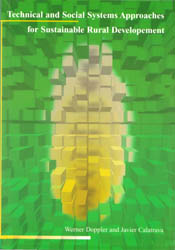
Technical and social systems approaches for sustainable rural development

The proceedings of the 2nd European IFSA Symposium (held in Granada, Spain) were edited by Werner Doppler and Javier Calatrava and published in 2000 at Margraf Verlag (ISBN 3-8236-1332-4), 380 pp.
Table of content
Theme 1:Sustainable farming and rural development.
The objective of the Second European Symposium was to present and discuss methods developed and applied in rural and farming systems and to intensify discussion between the various disciplines especially with natural sciences related to farming and rural development. This chapter presents key not papers and intents to set the frame for the discussion in the following chapters by focussing on the views and potentials of different disciplines.
Theme 2:Designing sustainable agro-ecological systems.
Part of farming system research has always been the design, in actual practice, of viable alternative farming systems which could replace conventional problematic systems. At present, such work is going on in several European countries, especially with a view to developing integrated, if not more ecological farming. Such a shift in farming system raises many issues. These issues are addressed in participatory research, sometimes involving networks of experimenting farms around experiment stations or experimental gardens. In this chapter an agenda for future (collaborative) research will be developed.
Theme 3:Integrating social and technical perspectives in natural resource management.
Agricultural science has been marked by a divide between three perspectives: the technical (agro-biology, soils, etc.), the economic (farm management, price policy, etc.) and the social (farmer organisations, common property rights, gender issues, resource use negotiation, etc.). The era which a purely technical focus dominated was replaced by one in which farm management and marketing became dominant themes. Now we enter an era in which the multiple goals of using natural resources, the evident shortcomings of high input agriculture, the marginalisation of agricultural sector and other problems ask for an approach in which, in addition to the technical imperative and market forces, the renegotiation of the role of agriculture at all societal levels is becoming a crucial issue. This asked for a systems perspective capable of integrating not just the technical and economic, but also the social sciences. This chapter will formulate an agenda for future (collaborative) research.
Theme 4:Making the most of agri-ecological diversity and local knowledge.
A key feature of European agriculture is its diversity and the century-old niches in which intelligent people have experientially created (very) satisfactory ways of high quality living. Market-driven competition focuses on efficient bulk production for unsophisticated supermarket consumers who spend their money on processed foods advertised on TV. Key European assets and values are therefor under throat. A key challenge for our systems perspective is to consider ways to capture Europe's diversity and strengthen regional achievement. This chapter will formulate an agenda for future (collaborative) research.
Theme 5:Policy and institutional development.
A farming systems perspective has important implications for thinking about (1) scenarios for the future, (2) conducive policy contexts and (3) criteria for institutional design. Addressing these issues is one of the key ways in which our farming system research can contribute and offer something. As scientists we are often fairly naive about the ways we assume our work leads to effective action. This chapter addresses more useful frameworks for thinking about its impact.
Theme 6:Training.
A farming systems perspective has hardly penetrated the curricula of European universities and agricultural schools and colleges. The increase of farm subsidies, the emergence of environmental issues, and the recognition of the unsustainability of present european agriculture and other discontinuities have stressed that present trends should definitely not be indicative of European destiny. The conventional ways of training professionals and policy makers have reached a critical point. The farming systems perspective and methods have much to offer and provide important and practical contributions. This chapter addresses the question how we can best go about it.
